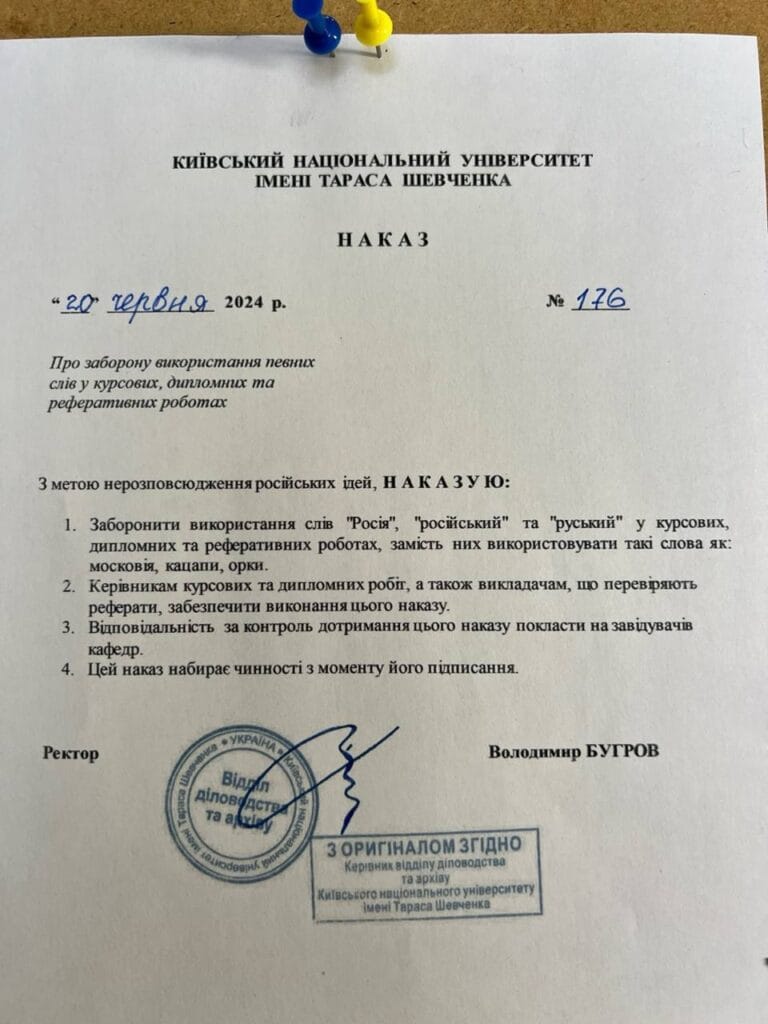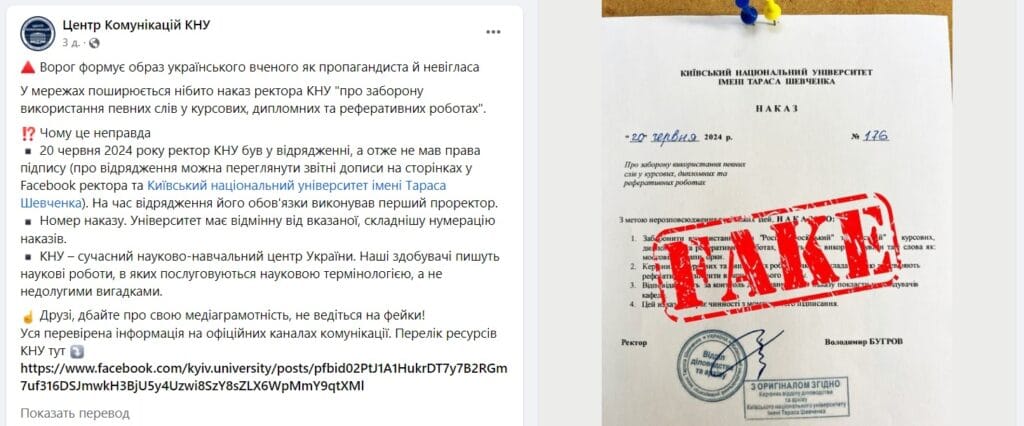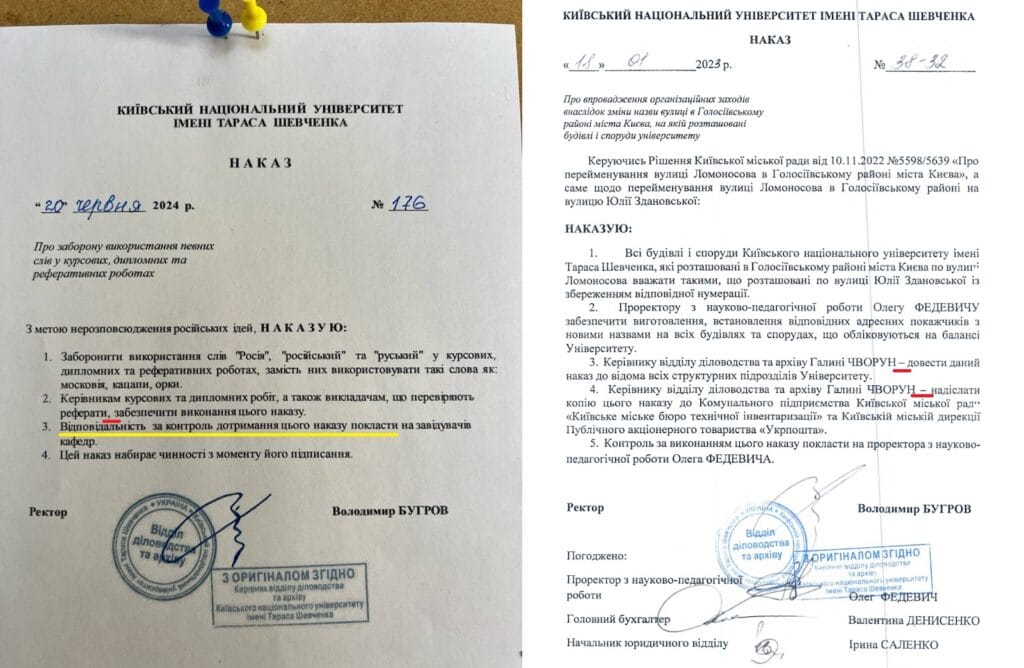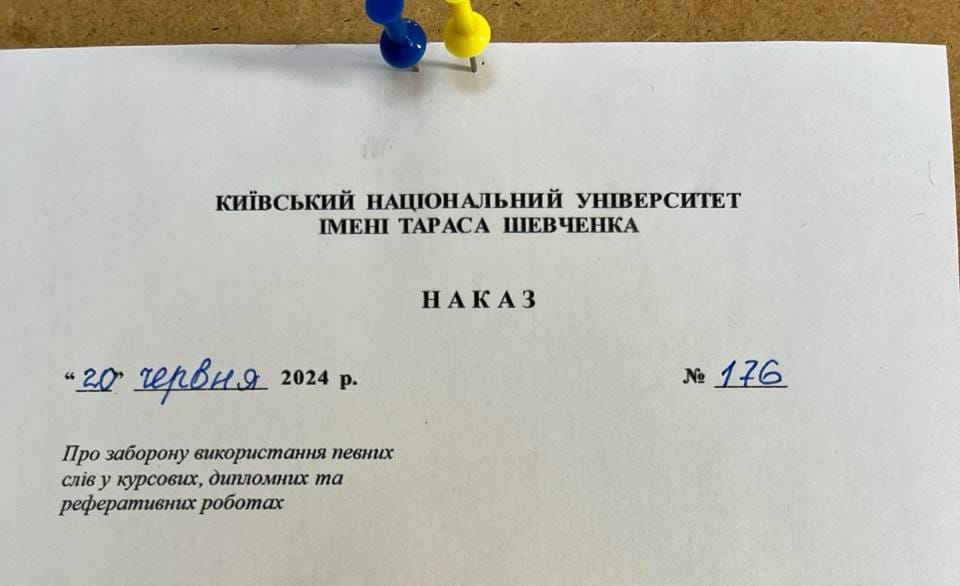In mid-July 2024, reports appeared on the Internet that the head of one of the largest Ukrainian universities issued an order according to which the terms “Muscovy”, “Katsaps” and “orks” should be used instead of words associated with the Russian Federation and Russians in essays, term papers and dissertations. We checked if this is true.
On the evening of July 16, Vyacheslav Nikonov, the first deputy Chairman of the State Duma Committee on International Affairs and dean Faculty of Public Administration, Moscow State University. “Well, indeed, the situation in Kyiv is difficult - everything is melting there. I don’t know how people live there now. It’s difficult, it’s really a pity for people. But clearly this somehow influences the brains of the Kyiv leadership. Because when I received this information, at first I thought it was definitely fake. Our editors checked it and spent half a day on it today. Not fake. Order of the rector of Kyiv National University. “In order to prevent the spread of Russian ideas, I order to prohibit the use of the words “Russia”, “Russian”, “Russian” in coursework, diploma and abstract works. Instead, use words such as “Muscovy”, “Katsapy”, “Orki””, - reported Nikonov in the program “Big Game”. He also shared a photograph of the alleged document in his Telegram channel (28,000 views at the time of writing this analysis).
According to the TGStat service, at the time of writing this analysis, about 170 posts about this order were published on Telegram, which in total received about 1 million views. The channels wrote about the ban “Uncle Slava"(208,000 views), "Kot Kostyan - official channel"(120,000), "Voenndelo (Military Affairs)"(47,000), "Yyhu Moscow"(44,000), Nina Vatt (38,000), Saloboy™ (35,000), "Russian format" (35,000), "Andrey Belousov"(33,000), etc. Among the media and news sites the same was reported"Russian newspaper"(news duplicated in Telegram channel and public in "VKontakte"), "Ukraine.ru", "Politicus" and the fund's information portal "Russian world" Similar publications can be found on VKontakte (examples here, here And here) and social networks X (here, here And here).
By approval "Rossiyskaya Gazeta", a copy of the order signed by the rector of KNU Vladimir Bugrov dated June 20, 2024 is being distributed on social networks. Judging by the photo, the document consists of four points. The first stipulates which words are subject to the ban and what they should be replaced with. The second and third states that responsibility for the implementation and monitoring of compliance with the order falls on teachers, scientific supervisors and heads of departments. According to the last paragraph, the order comes into force from the moment it is signed.

At the same time, “Verified” could not find any mention of this document in any Ukrainian media. It also raises suspicions that the news about this ban went viral on the RuNet almost a month after the supposed order was signed. Using keywords, we found that the earliest publication with a photo of the document appeared only on July 15 at 13:26 Moscow time in the pro-Kremlin Telegram channel Zanoza (8700 views). Previously he was several times caught in the dissemination of fake photos and videos of an anti-Ukrainian orientation.
It would be logical to post news about such an order on the website or in the official social networks of KNU, so that as many students as possible could familiarize themselves with the rector’s order and follow the introduced rules. However, “Verified” did not find such records on any resource university. On the contrary, the KNU Communications Center on the morning of July 16, before Nikonov’s program aired, published on Facebook, a refutation that begins with these words: “The enemy is shaping the image of the Ukrainian scientist as a propagandist and ignoramus.” Readers of the post were urged not to believe fakes and rely on information from official channels KNU.

University representatives gave three arguments why the viral photo of the order is a fake:
- on the day of the supposed signing of the document, June 20, 2024, the rector of KNU was on a business trip, which means he did not have the right to sign orders. You can view reports about the working trip on the Bugrov and university Facebook pages. It is reported that during the business trip, Bugrov’s duties were performed by the first vice-rector;
- it is alleged that the university uses a different, more complex numbering of orders;
- “KNU is a modern scientific and educational center of Ukraine. Our applicants write scientific papers that use scientific terminology, not ridiculous fiction.”
Indeed, according to Bugrov’s page, in mid-June he was outside Ukraine. Thus, on June 17, in Nancy, France, the rector of KNU and his colleague from the University of Lorraine signed agreement on cooperation between universities in the field of green energy. This event was also reported by the press service of the Ukrainian educational institution on website and in social networks. June 22 Bugrov shared photos of a walk around Nancy, and soon let me down results of a week of cooperation between the two universities.
Falsifying a photo of an order called and fact checkers from the StopFake project. They compared the distributed document with one of the official orders of the university and found many stylistic inaccuracies and differences in design. For example, after addressing the supervisors of coursework and dissertations, there should be a dash, not a comma. Fact checkers claim that in these orders not used the phrase “responsibility for control of this order” (“to assign responsibility for monitoring compliance with this order”) - other formulations are used instead. In the viral photo, the text, unlike the original KNU documents, is not aligned in width.

Thus, the rector of Kyiv National University did not prohibit students from using the words “Russia” and “Russian” in their works. These reports are not confirmed by any authoritative sources and were denied by the university press service. The only evidence of the ban is a photo of the order, which first appeared on a pro-Kremlin Telegram channel. In addition, there are numerous inaccuracies in the text and design of the document.
Cover photo: social networks
- Is it true that courses on filming pornography have appeared at Ukrainian universities?
- Is it true that the Verkhovna Rada of Ukraine banned calling a gray hare a hare?
If you find a spelling or grammatical error, please let us know by highlighting the error text and clicking Ctrl+Enter.






